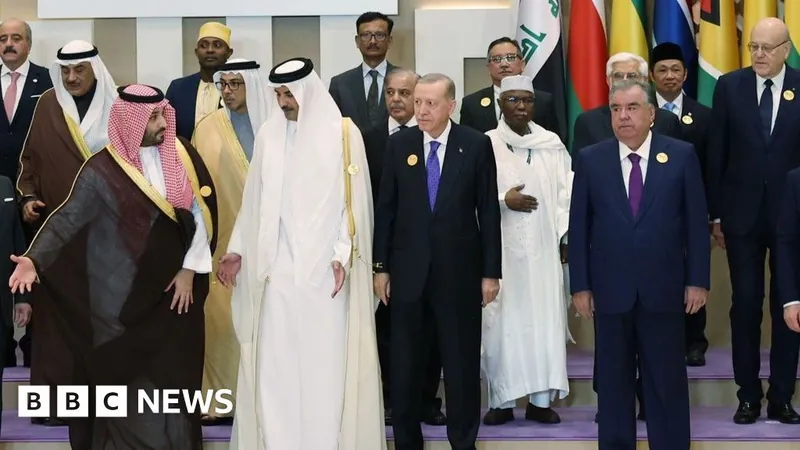
Saudi Crown Prince Declares Israel’s Actions in Gaza as 'Genocide' Amid Escalating Tensions
2024-11-12
Author: Jessica Wong
Saudi Crown Prince's Strong Condemnation
Saudi Crown Prince Mohammed bin Salman has launched a fierce denunciation of Israel's military operations in Gaza, labeling them as "genocide" during a recent summit attended by Muslim and Arab leaders. This statement represents some of the most severe public condemnation of Israel by a Saudi official since the onset of the ongoing conflict.
Criticism of Israeli Actions
During the summit, which aimed to address the crisis, the prince also criticized Israeli strikes against Lebanon and implied that actions should cease before more countries become entangled in the conflict. While Israel has staunchly denied allegations of genocide, the comments from the Saudi leader signal a shift in rhetoric and an intensified concern over escalating violence in the region.
Warming Relations Between Saudi Arabia and Iran
There were indications of a warming relationship between Saudi Arabia and Iran, marked by the prince's warning to Israel against launching attacks on Iranian territory. This diplomatic thaw might reflect wider strategic considerations in the region, particularly against the backdrop of Iran's increasing influence.
Calls for International Intervention
Alongside the Crown Prince, Saudi Arabia's Foreign Minister, Prince Faisal bin Farhan Al-Saud, lamented the “failure of the international community” to intervene and halt the violence, accusing Israel of instigating dire humanitarian conditions, including starvation in the Gaza Strip. His remarks have garnered attention, emphasizing a collective call for an immediate cease-fire and a complete Israeli withdrawal from both the West Bank and Gaza.
Escalating Conflict and Humanitarian Crisis
The conflict in Gaza escalated dramatically following Hamas's attack on October 7, 2023, which resulted in the deaths of approximately 1,200 individuals and the hostage-taking of 251 others. Israel's forceful military response has reportedly resulted in over 43,400 casualties in Gaza, according to figures from the Hamas-run health ministry. A recent report from the UN's Human Rights Office further troublingly noted that nearly 70% of identified victims in Gaza over the past six months were women and children, highlighting the severe toll on civilian life.
Condemnation of Attacks on UN Personnel
Moreover, summit leaders voiced their dismay at what they described as Israel's “continuous attacks” on UN personnel and facilities within Gaza. This ongoing violence occurs in a context where the Knesset recently passed legislation prohibiting the UN's Palestinian refugee agency, UNRWA, from operating in Israel and East Jerusalem, citing accusations of its collaboration with Hamas. The implications of this legislative move have raised alarms among several nations, including the US and UK, due to concerns about the impact on humanitarian aid delivery to Gaza.
Geopolitical Considerations and Trump's Potential Return
Adding another layer of complexity to the situation, the potential return of former President Donald Trump to the White House looms on the horizon. Gulf leaders recognize his close ties to Israel but maintain hope that his negotiation skills could be leveraged to broker peace in the region. Interestingly, Trump's standing in Saudi Arabia appears to be more favorable compared to that of President Biden, as his past decisions—such as the recognition of Jerusalem as Israel's capital—remain points of contention in the Muslim world.
Urgency for Stability Amidst Tensions
The discussions at the summit encapsulated a growing urgency among Arab leaders, seeking stability amidst a chaotic landscape where longstanding grievances continue to fuel tensions. Among the highlights, one editorial in a prominent Saudi publication reflects this sentiment with a bold headline: "A New Era of Hope: Trump’s Return and the Promise of Stability," indicating the potential for shifting geopolitical alliances and expectations for peace negotiations in the turbulent landscape of the Middle East.



 Brasil (PT)
Brasil (PT)
 Canada (EN)
Canada (EN)
 Chile (ES)
Chile (ES)
 España (ES)
España (ES)
 France (FR)
France (FR)
 Hong Kong (EN)
Hong Kong (EN)
 Italia (IT)
Italia (IT)
 日本 (JA)
日本 (JA)
 Magyarország (HU)
Magyarország (HU)
 Norge (NO)
Norge (NO)
 Polska (PL)
Polska (PL)
 Schweiz (DE)
Schweiz (DE)
 Singapore (EN)
Singapore (EN)
 Sverige (SV)
Sverige (SV)
 Suomi (FI)
Suomi (FI)
 Türkiye (TR)
Türkiye (TR)